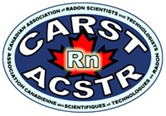 Canadian Association of Radon Scientists and Technologists Helping Canadians Reduce Radon Risk |
|
Menu
Log in
© 2011-2025 Canadian Association of Radon Scientists and Technologists (CARST/ACSTR). All rights reserved.
CARST is proud to unite members from across Canada, which encompasses the traditional territory of many First Nations, Métis Peoples, and Inuit whose ancestral footsteps and rights extend beyond the colonial boundaries that exist today. We respectfully honour these Peoples' rights, history, and relationships with this Land.
Powered by Wild Apricot Membership Software